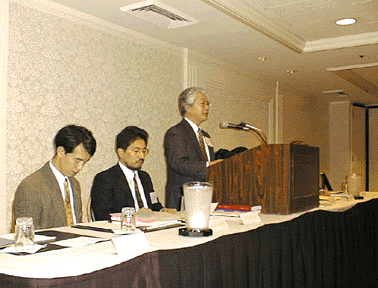"The Scope and Potential of Islamic Area Studies"
December 5, 1998
MESA Workshop (December 3-6 1998; Chicago, USA)

Ā@
Ā@
"The Scope and Potential of Islamic Area Studies"
December 5, 1998
MESA Workshop (December 3-6 1998; Chicago, USA)

A five-year project entitled "Islamic Area Studies" was begun in April of 1997 in order to collect information and create a computerized information system which will deepen our understanding of the Islamic world. The project plans to do multidisciplinary research on Muslim societies in both Islamic and non-Islamic worlds, reflecting the fact that areas with close ties to Islam now encompass the world. Comparative area studies will be conducted in order to investigate each area as well as interregional problems. The scope and potential of this new field of Area Studies will be defined through discussions about research methods which emphasize comparative and historical analysis.
Members Attending
††† Tsugitaka SATO (chairman)
††† Masayuki AKAHORI
††† Akira USUKI
††† Yasushi KOSUGI
††† Nariaki NAKAZATO
††† R.S. HUMPHREYS
Fees were sponsored by the IAS Project Management Unit.
Introductory Remarks by SATO Tsugitaka
1. New Elements of Islamic Area Studies
††† *The Islamic Area Studies Project (April 1997-March 2002) addresses a combination of several regions with fixed boundaries tied together by the religion and civilization of Islam, which has expanded beyond its original borders
2. What is Islamic Area Studies?
††† *Importance of Muslim issues not only in the Middle East and Southeast Asia, but also in Central and South Asia, China, Europe, the United States and Africa
††† *Two ways to synthesize the results of disciplinary research activites: the historical approach and comparative studies
3. The Purpose of Islamic Area Studies
††† *to collect as much concrete information as possible related to Islam by conducting field research
††† *to develop a computer system applicable to Area Studies
††† *to publish an Islamic Area Studies series in both Japanese and English
Our Special Workshop in MESA
SATO Tsugitaka
Ā@Ā@On the 5th of December 1998, a session entitled "The Scope and Potential of Islamic Area Studies", sponsored by the Islamic Area Studies Project, was held in Chicago as a special workshop at the annual meeting of the Middle East Studies Association of North America (MESA). In addition to the chairperson (SATO Tsugitaka) and five panelists (AKAHORI Masayuki, KOSUGI Yasushi, USUKI Akira, NAKAZATO Nariaki, Stephen HUMPHREYS), about thirty scholars assembled at the workshop for two hours at the Chicago Hilton and Towers.
Ā@Ā@In his introductory remarks, SATO explained that the project plans to conduct multidisciplinary research on Muslim societies in both Islamic and non-Islamic worlds. Particularly he stressed research methods which emphasize comparative and historical analyses as a means of synthesizing the results of disciplinary research activities. AKAHORI introduced the achievements and the perspectives of Japanese anthropologists who have offered distinctive contributions both to the field of anthropology in general and to other disciplines within Middle Eastern studies. KOSUGI discussed the correlations between the Islamic revival movements and the formation of the Islamic world as we see it today, focusing on contemporary Islamic political ideas and movements in the Middle East and Africa. USUKI, after reflecting on the continuity and discontinuity of academic discourse in pre-War and post-War Japan, cited Palestinian identity as an important element of a new historiography in Japan. NAKAZATO enquired into some difficult problems which arose in South Asia when Muslims began to assert their political identity during the late colonial period. HUMPHREYS debated that although area studies has been severely criticized, historians have never found area studies troubling, because the same charges have been leveled at history since Descartes or even Aristotle.
Ā@Ā@Following the five panelists' presentations, participants raised some issues: "What is the intention of emphasizing the historical approach in Islamic Area Studies ?" "What is the present situation in Japan concerning the use of Arabic material sources for Middle Eastern studies ? "How is the Arabic language teaching system in Japanese universities?" " Are scholars who are specialized in Islam as a religion participating in the project?" Certainly, we still do not have common methods among us to synthesize the results of disciplinary research activities. However, it may well be said that most of the participants really enjoyed the workshop and evaluated Islamic Area Studies as a new and important approach to a better understanding of Islam as a religion and a civilization in the world.
Ā@